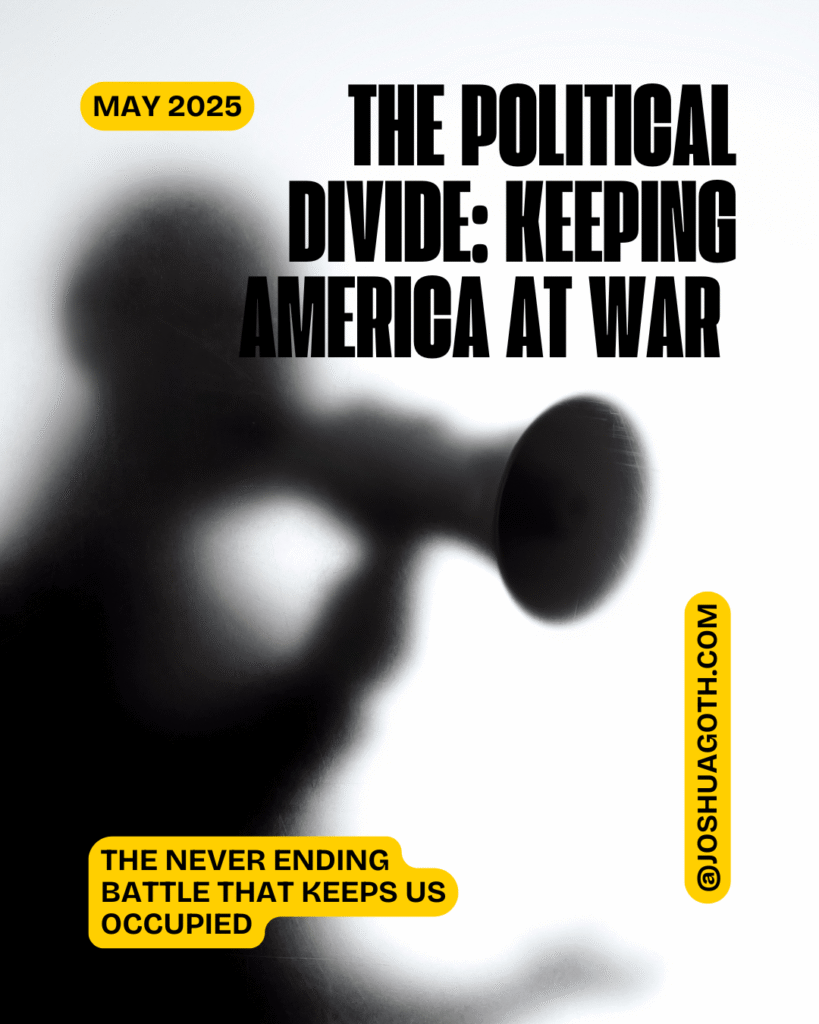The True Cost of Politics: A Call to Unite
As I navigate the complexities of our society, I’m compelled to acknowledge that I don’t engage in political discussions. My decision isn’t driven by a lack of interest or willingness to debate; rather, it stems from a profound understanding of politics’ divisive nature. The truth is, politics can cleave even the most closely-knit relationships – families, friends, and loved ones – apart.
The media’s influence plays a significant role in perpetuating this divide, shaping our perspectives and fueling animosity towards one another. Rather than holding those responsible accountable, we’re pitted against each other, locked in an endless cycle of polarization. The perpetual battle between the Left and Right consumes our attention, leaving us fractured and disunited.
As a civilization, we should strive to collaborate, not compete. It’s time for us to redirect our focus away from petty squabbles and towards the pursuit of common goals. Let’s work together to bridge the gaps that politics has created, fostering an environment of understanding, empathy, and unity.
The Root Causes: How Politics Divides Us
In a society as vast, diverse, and dynamic as America, it’s no surprise that political ideologies vary widely. However, the growing polarization in our country has led to an increasingly hostile environment in which individuals feel alienated from one another based on political affiliations. This divisiveness stems from several factors:
- Media Echo Chambers: The proliferation of media outlets catering exclusively to specific ideologies means that people are more likely to consume news and information that aligns with their beliefs, reinforcing existing biases and fostering mistrust of opposing viewpoints.
- Social Media Algorithms: Social media platforms have created echo chambers by prioritizing content that confirms our pre-existing beliefs and hiding opposing viewpoints. This further isolates individuals from engaging with diverse perspectives, deepening the divide.
- Partisan Gerrymandering: The manipulation of electoral districts for political gain has led to an increasing number of ‘safe’ seats for each major party, which discourages compromise and collaboration in Congress.
- Polarized Political Discourse: A tendency towards exaggerated rhetoric, ad hominem attacks, and demonization of opposing viewpoints has made it difficult for people from different political ideologies to engage in productive, constructive conversations.
The Consequences: The Impact of Polarization on America
Political polarization has far-reaching consequences that affect us all. When we focus on hating one another instead of working together, we lose sight of the common goals that unite us as Americans. Here are some ways this divisiveness affects our nation:
- Decreased Productivity and Collaboration in Government: With both sides entrenched in their positions, compromise becomes increasingly difficult, leading to gridlock, inaction, and a failure to address pressing issues.
- Reduced Social Cohesion: A fractured political landscape erodes trust among citizens, fosters a sense of alienation, and undermines the social bonds that help hold society together.
- Polarized Public Opinion: When individuals are more likely to engage with like-minded people and consume biased news, public opinion becomes increasingly polarized, making it harder to find common ground on contentious issues.
- Increased Polarization Among Youth: As children observe the harsh, divisive political environment around them, they may internalize these attitudes, perpetuating the cycle of division and mistrust.
The Path Forward: Fostering Unity in a Divided America
So, how do we break free from this vicious cycle and cultivate an environment that encourages collaboration, understanding, and unity? Here are some tips to help us bridge the divide:
- Embrace Empathy: Seek to understand the underlying values, fears, and motivations that drive others’ political beliefs. Remember that people on the ‘other side’ are not evil or stupid, but simply have different experiences and viewpoints.
- Cultivate Curiosity: Engage in respectful, open-minded conversations with individuals from diverse political backgrounds. Ask questions to broaden your understanding of their perspectives, and be willing to share your own viewpoint without resorting to personal attacks.
- Expand Your Media Diet: Challenge yourself to consume news from a variety of sources, both mainstream and alternative, to avoid becoming entrenched in an echo chamber. Fact-check information before sharing it and be aware of biased reporting.
- Prioritize Constructive Dialogue: Reframe conversations around shared values and common goals, rather than focusing on differences. Emphasize finding solutions to problems instead of debating who’s right or wrong.
- Engage in Local Activism: Find ways to make a difference at the local level, working alongside individuals from diverse political backgrounds to address community issues and foster collaboration.
- Encourage Civil Discourse: Advocate for constructive conversations both online and offline, using social media platforms to engage in respectful, solutions-oriented dialogue instead of fueling divisiveness.
- Model Unity: Lead by example, treating others with kindness, respect, and understanding, and encouraging others to do the same.
A United America: A Future Worth Fighting For
It’s essential to remember that we are stronger together than apart. By fostering empathy, curiosity, and constructive dialogue, we can bridge the divide in American politics and work towards a more united, collaborative future. Let us strive to be part of the solution, empowering one another to overcome our differences and build a brighter tomorrow for everyone.



